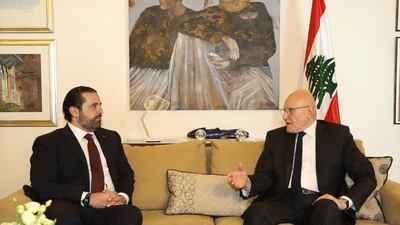Lebanese prime minister-designate Saad Hariri met with several parliamentary blocs on Monday as he began the process of consulting parties and new MPs to form the country's next government.
The talks came the day after several Lebanese newspapers quoted Parliament speaker Nabih Berri as saying that the new cabinet should be formed by the end of Ramadan in mid June. He was reported as saying that no party had an interest in delaying the formation of government, adding that Hezbollah would not be making “impossible demands” but that it would get its share of seats.
Mr Hariri was tasked with heading the next government last week, with 111 of the 128 MPs voting for the former prime minister. He hopes to form the government quickly, he said, in order to maintain legislative momentum from the outgoing cabinet and parliament.
Lebanon is seeking to implement a number of economic reforms and pass long-awaited decrees in order to capitalise on the nearly $11 billion in loans and grants pledged by the international community at April’s CEDRE conference to invest in the country’s crumbling infrastructure. Mr Hariri has said that implementing the previous administration’s Capital Investment Plan, pitched at the Paris summit, could lead to tens of thousands of new jobs over the next five to 10 years.
Hezbollah – which the US designates a terrorist entity – held two ministries in the previous cabinet but Washington has indicated that the party taking more seats could jeopardize ongoing support.
After a meeting with Mr Hariri, Mohammad Raad, an MP with Hezbollah’s ‘Loyalty to the Resistance’ parliamentary bloc, said that they would seek the Finance Ministry as well as a new full ministry post they have floated called the Planning Ministry. Local media reported that this was in line with Hezbollah’s plans to tackle corruption, a central pillar of their election campaign.
The National News Agency (NNA) reported that when asked about recent US sanctions on senior Hezbollah officials, Mr Raad said that they were external influences, but did not elaborate.
___________
Read more:
Lebanese politician meet for first parliamentary session
US-Gulf sanctions target top leaders of Hezbollah
Michael Young: Hezbollah's rise is price Lebanon paid for handing control Syria after civil war
___________
The speaker’s bloc has called on Mr Hariri to increase the number of women in Cabinet by allocating a quarter of seats for female ministers. The call was backed by MP Bahia Hariri, Mr Hariri’s aunt who represented his Future Movement.
Gebran Bassil, the caretaker foreign minister and head of the Free Patriotic Movement – who took a seat in parliament at May’s election and now lead’s the ‘Strong Lebanon’ bloc – called for the formation of a national unity government with the largest representation from across the political spectrum.
One of the most contentious challenges will be reconciling parties demands for the so-called sovereign portfolios – the interior, defence, foreign and finance ministries. Although Lebanon has no fixed number of ministers and each cabinet can fluctuate in size, there is a limited number of coveted key portfolios.
“We have been deprived of the finance or interior ministries for years,” Mr Bassil said. “It is about time our bloc be granted one.”
He also advocated that key portfolios be offered to ministers representing some of the smaller sects in Lebanon’s 18 officially recognized denominations, according to the state-run NNA. "We are not keeping portfolios for [specific] sects or political forces." The sovereign ministries are currently equally distributed between Christians and Muslims.
Mr Bassil also said that the ministerial statement – in effect the government’s manifesto read to parliament before taking office – should include facilitating the return of Syrian refugees, the dire economic situation and drafting an emergency plan, tackling the country’s rampant corruption and implementing administrative decentralisation. Lebanon officially hosts just under 1 million Syrian refugees but the government places the real figure at upwards of 1.5 million people displaced by the neighbouring conflict.
Teymour Joumblatt, who succeeded his longtime Druze political leader father Walid Joumblatt as head of the Progressive Socialist Party’s ‘Democratic Gathering’ parliamentary bloc, told Mr Hariri that the next government should focus on national unity and be representative of the political landscape after the last election.
Former prime minister Tammam Salam took a different tack and urged caution and deliberation in cabinet formation discussions. After meeting Mr Hariri, the NNA quoted him as saying that he had encouraged Mr Hariri not to rush cabinet formation and to ensure the rotation of key ministries.
He also dismissed speculation that he could return to Cabinet and said he backed Mr Hariri’s push to not have MPs also serving as ministers. Mr Salam was re-elected on the prime minister-designee’s Future Movement list to represent Beirut’s second district.
Most major parties have said they would not nominate MPs for ministerial posts, excluding Mr Hariri, who is an MP for Beirut’s second district and has already been nominated Prime Minister.
Newly elected deputy parliament speaker Elie Ferzli also said that it was important that while Cabinet was representative it wasn’t all-encompassing. He said that if all parties had a place in government it would be indistinguishable from parliament and there would be no opposition voices. He later clarified that this was not an attempt to sideline any single parties.
"How can [cabinet] be overseen if there is no opposition in Parliament?" he asked. "I cannot imagine Parliament without an opposition."

